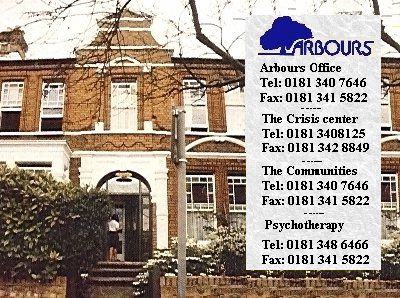The Fundamental Principles
The Arbours Association is a registered charity and was founded in 1970 to provide personal, psychotherapeutic support
and places to live outside mental hospitals for people in emotional distress. The following excerpts from our first brochure present some of our motivating
believes which we continue to hold today:
'We feel it more helpful and humane to give persons who been or could
become mental patients a chance not to be seen as mentally ill, called
mentally ill, or treated as mentally ill. There are importand reasons for this approach. The "mentally ill person" tends to take on others'
unsympathetic attitudes and addicate responsibility for this life to outside authorities and institutions, all to his detriment. He may become type-cast
and see no possibility for himself other than to embark on a long-term carear as a mental patient.
'Many people who might otherwise be trapped within an ill identity need the opportunity and encouragement to come to terms with their problems. We
intend that Arbours should be a place where people may encounter selves long forgotten, where they can contain and regain their experiences, and achieve a sense of integrity and autonomy.'
Since the first Arbours community opeened in 1970, the organisation has slowly expanded
to provide three Therapeutic Communities, a Crisis Centre, A Phychotherapy Service and A Training Programme in psychotherapy. Individuals and families who use our services
include those who suffer from depressive or phychotic breakdown, self-mulilation, adolescent crisis, personality and eating disorders, sexual problems, anxiety, depression,
relationship difficulties and well as problems relating relating to critical life events, such as
marital breakdown and redundacy.
The Crisis Centre
The Crisis Centre was established in 1973 to provide personal, phycotherapeutic
support ti individuals, couples or families threatened by by mantal and social breakdown. Our goal
is not to simply alleviate mental pain or to stop bizzare or disructive behavior, but to contain it and to help people make sence of it. We believe an emational crisis can be a
turning point, an opportunity for growth and development.
The Crisis Centre provides an immediate specialized response to sudden emergencies throughout its crisis consultations whether at the Centre itself or, when indicated at the caller's own home.
The person(s) concerned are asked to meed with team of therapists in order to access the nature of the crisis and the kind of intervention that may be most useful.
Non-Residencial
The consultation may in itself become a focused crisis intervention or brief phychotherapy which aims to help people quickly resume normal functioning and remain within the home environment.
Residential
When more intensive care may be useful, the Centre will invite the person concerned to come for a stay. This may be for a few days, several weeks or months.
The Centre is unique because it is also the home of the Resident Therapists. People who come to live at the Centre are their guests. the house can accomadate up to six guests at one time. Each
guest is part of a team which includes a Resident Therapist and a visiting therapist (the Team Leader).
The guests participate in three or more meetings of the team each week, plus a daily meeting of the entire house which include art and movement..
The usual outcome is for a guest to return home. Alternatively some move to an Arbours long stay community.

SANCTUARY
THE ARBOURS EXPERIENCE
OF ALTERNATIVE COMMUNITY CARE
edited by Joseph H Berke, Chandra Masoliver and Thomas J Ryan
Sanctuary in not simply a physical place of safety. It is a state of mind. Sinnce its foundation in 1979, the Arbours Association
has been providing sanctuary for people in great emotional turmoil, without their having to be seen, called of treated as 'mentally ill'.
It has grown to imclude three residential communities, a crisis centre, a psychotherapy service and a psychotherapy training programme.
This collection commemorates 25 years of work of the Arbours. It includes historical accounts, and reflections by therapists, students, and residents
about this highly original approach to providing refuge within specialised therapeutic communities for people in severe distress.
The Arbours have often intervened on behalf of the most disturbed, the most chaotic, the most self-distructive individuals.
They are often labeled 'borderline' or 'psychotic in conventional psychiatric classifications, people who other psychotherapists and facilities would not approach
psychotherapeutically. One of the most striking features of this book is the detailed descriptions of individual, group and institutional dynamics that prove the foundation of the
Arbours' practical and theoretical accomplishments.
The distinguished psychoanalyst, Dr. Nina Coltart, who contributes the concluding chapter, has written, 'I continue to observe the growth of Arbous with great admiration. They build a thorough
analytic training for their students, created a low fee clinic for patients, established and nurtured their community houses, ran the Crisis Centre and earned themselves a unique and
respected place on the London therapy scene.'
Process Press, London
Available from the Arbours Office at £16.00
Order From: 6 Church Lane, London. N8 7BU Tel: 0181 340 7646


![]()

![]()